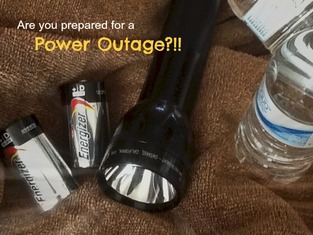 Unexpected circumstances happen all the time and breed stress and anxiety in all of us. Sometimes just the realization that something will eventually arise to derail our best-laid plans makes us feel anxious. While you can’t plan for every contingency (you’ll drive yourself crazy if you try), there are many things you can do now to mitigate the stress and chaos that rear up when it does happen: Get organized C’mon, you already knew I was going to say this, didn’t you? But it is true that organization makes you more nimble in a crisis. When your home is in order, you can locate necessities in a hurry, other people are better able to assist you, and repair people have easier access to areas requiring attention. Having a firm handle on your time and to-do list facilitates rearranging your schedule at the last minute and delegating responsibilities to others. Maintaining current contact info and keeping important documents at your fingertips also speed up everything when time is of the essence. Finally, planning meals in advance (including an emergency back-up dinner plan for those surprisingly hectic days) ensures you maintain your healthy eating plan and avoid the fast-food drive-thru, even on the busiest night. Maintain an emergency fund Home and car owners know that Murphy’s Law is real. Whatever can go wrong will go wrong at some point, guaranteed! Those unexpected repairs can cost beaucoup bucks in addition to the sheer inconvenience they bring. Setting aside money from each paycheck and keeping it in an easy-access account saves you from having to borrow (often at high interest rates) or worsening the damage by delaying a much-needed repair until you can afford it. Assemble an emergency kit Actually, make several. Gather you are likely to need in an emergency and store them in a convenient spot. Here are just some examples:
Back up electronic records Technology is great...until it isn’t. Our heavy reliance on electronic storage of information comes at a disadvantage when we can’t access our usual tools due to a power outage or internet disruption. Keeping a written list of your passwords, account/policy numbers, prescription drug and other key medical info, and even your driver’s license and social security numbers in a safe and secure place can be a lifesaver in such circumstances. I once had a client whose husband lost all of his identification (passport, driver’s license, social security number and birth certificate). Replacing each lost document required having at least one of the others. It was a nightmare! Fortunately, his wife thought that maybe she remembered his driver’s license number...and she did! It saved the day! Stay Connected Quick communication can make all the difference in an emergency. Keep your phone adequately charged (unlike my kids who run it all the way down before recharging). Make sure you have updated contact information handy at all times for the following:
Choose an “Emergency Buddy” Identify someone reliable and trustworthy who lives locally but not with you and ask them to be your Emergency Buddy. Give them a copy of your home and car key/s, tell them where they will find your various kits, and grant them permission to pick up your children at school/daycare, if necessary. Add them to your list of emergency contacts and make sure they know how to reach other key members of your circle and vice versa. This way, they can assist if you are incapacitated or need help retrieving key items from your home during an emergency. Devise escape and meetup plans Especially if you have young children, it is crucial to practice what to do in case of a fire, tornado or other emergency. Devise escape routes and designate a meeting spot in case you get separated. Help your children memorize your phone number and address and teach them when and with whom to share this information (and when not to). Make sure they know where to go for help if you get separated from them while away from home and when/how to call 911. Ensure that everyone in your household knows where to find the spare key and/or how to contact your Emergency Buddy. With a little organization and advance planning, even reducing the stress and anxiety that accompanies life’s curveballs will be easy peasy. Don't miss out! Sign up to have each new EPL Blog post delivered to your inbox each week.
0 Comments
 Did you say "Back to School"? Why yes. Yes, I did. Now, before you start throwing rotten apples at me, just hear me out. I know, I know...the whole family is in celebration mode now that school is out for the summer. No doubt you have swim meets, ice cream socials and long, lazy mornings on the brain. The very last thing you want to focus on is that dirty, dingy backpack that was thrown into the corner on the last day of school, overflowing with crumpled papers, half-used journals, crumbling erasers and stubby, unsharpened pencils. But believe it or not, this is perfect time to get a jump on preparations for the Fall. First, though, I want to put you out of your misery by saying "NO!" No, you do NOT need to keep all the math homework from this past year. No, you are not a bad parent if you toss out all the old reading logs, homework assignments, and agenda books without even looking at them. (Hopefully you've paid enough attention during the year to know where your child needs some extra help.) And most of all...No, you most definitely SHOULD NOT feel guilty for tossing out the majority of masterpieces created by your budding Van Gogh or Shakespeare. The older your kids get, the easier it will become to part with all but the most labored-over or heartwarming pieces of work they produce. More is NOT better. In fact in this instance, more is actually less...less meaningful, that is. If it helps, set aside a half-hour to sit with your child and go through the papers and artwork together. Have them tell you about their experiences working on them. Ask questions about their thought process. Allow them to pick one or two favorites to keep. Then you pick one or two of your own. Then toss the rest. Yes, TOSS THEM!!! If necessary, do the tossing when your child isn't around. But please trust me on this. You will never regret it, and neither will they, mostly because neither of you will remember what you tossed a year from now. And the stuff you selected to keep just gained in value due to its rarity. Best of all, neither of you will be saddled with the burden that a HUGE bin of old papers will become if you don't make some meaningful decisions now. Next, designate a place to store your selected keepsakes and put them away. Assign another spot for storing reusable school supplies for next year, and toss out all the worn out, broken, dirty crumbly stuff you know you won't use. Wash the backpacks and lunch boxes and put them away too. Finally, put that school supply list for next year in a safe spot or hang it on the fridge, but first cross off all the things you already have ready and waiting in your stash of supplies so you don't buy them again. Now that you're done, go enjoy a well-deserved dip in the pool, knowing you've already got a start on another successful school year! Your friends may poo-poo your efforts, but you'll be the one laughing all the way to the pool on the last day of summer while they're fighting through the crowds at Staples trying to grab the very last yellow folder.  We've all heard the old saying that house guests are like fish...after three days, they both start to stink. However, in both cases, the foulness can be avoided if you prepare properly. Festivities such as weddings, holidays and graduations frequently include overnight guests from out of town, and all too often we find ourselves scrambling at the last minute to clean the house and search for extra pillows in the midst of the existing chaos of preparing for the event itself. With the holidays fast approaching, now is the perfect time to start laying the groundwork for anticipated visitors by taking some or all of these steps:
 We've all experienced a frantic run on toilet paper, bread and water at some point in our lives, in preparation for a big snowstorm or hurricane, but as I learned this past weekend, it doesn't always take a storm to leave you in the dark! Power outages can strike anytime, anywhere, just when you least expect them...like as you are arriving home from the store with a trunk full of perishable groceries...UGH! Yes, we were treated to not one but FOUR power cuts in a 36-hour period this weekend due to a faulty transformer up the street. Just my little group of eight town homes were affected...lucky us! Fortunately, they restored it once and for all just as I was heading out the door to get ice for my fridge/freezer...but not before my poor hubby, who was off of work and in "vampire mode" (staying up all night and sleeping during the day in preparation for a string of night shifts), had to spend a very long night sitting alone in the dark with no electronics to keep him entertained. So how prepared are you for an unexpected power outage? Here's a checklist of items you should always have on hand to minimize that powerless feeling when the lights go out:
Most of all, keep a good attitude. While losing electricity can be challenging, it's also offers a great opportunity to spend quality time with loved ones, catch up on some reading, and tap into your inner pioneer. Being prepared will help take the stress out of the situation so that you can relax and enjoy roughing it a little. |
AuthorValerie Sheridan is a professional organizer, wife, mother of two, and Founder/Owner of EasyPeasy Living. Archives
October 2022
Categories
All
|

 RSS Feed
RSS Feed